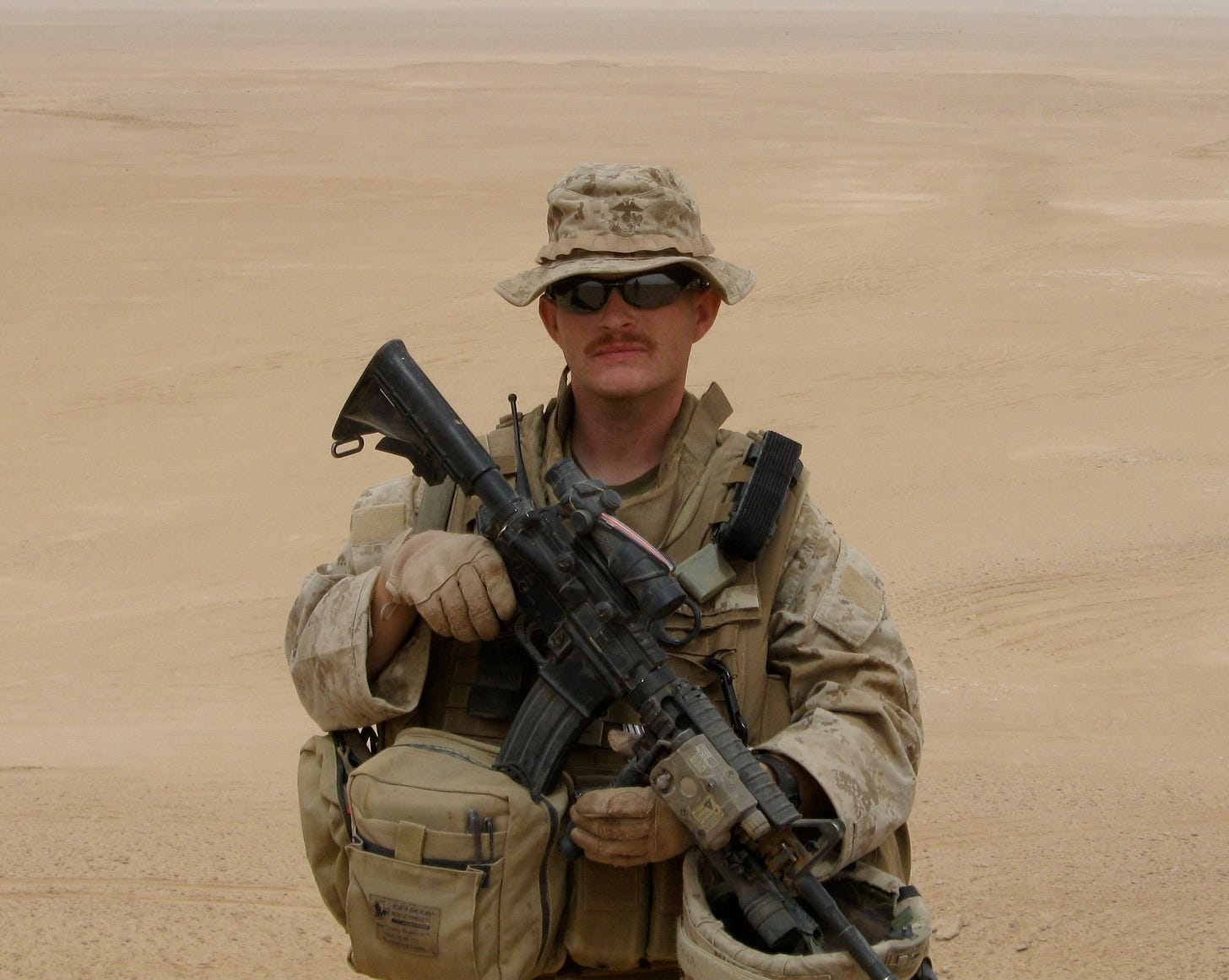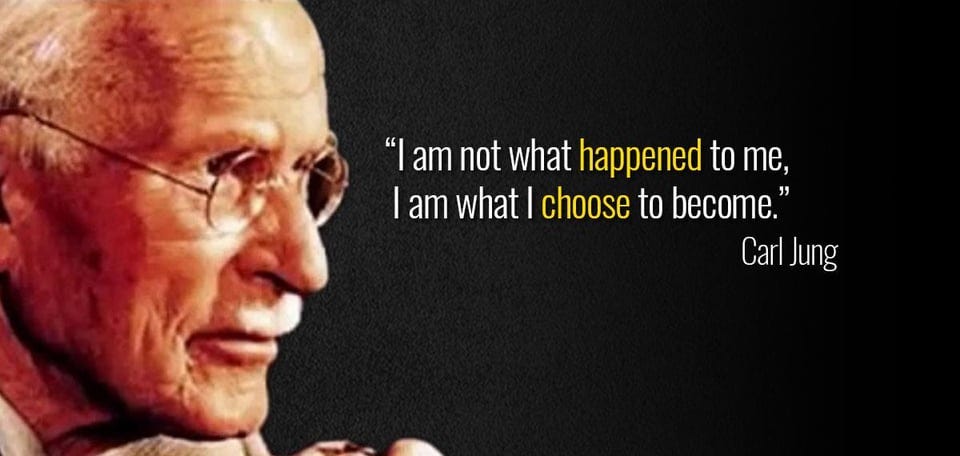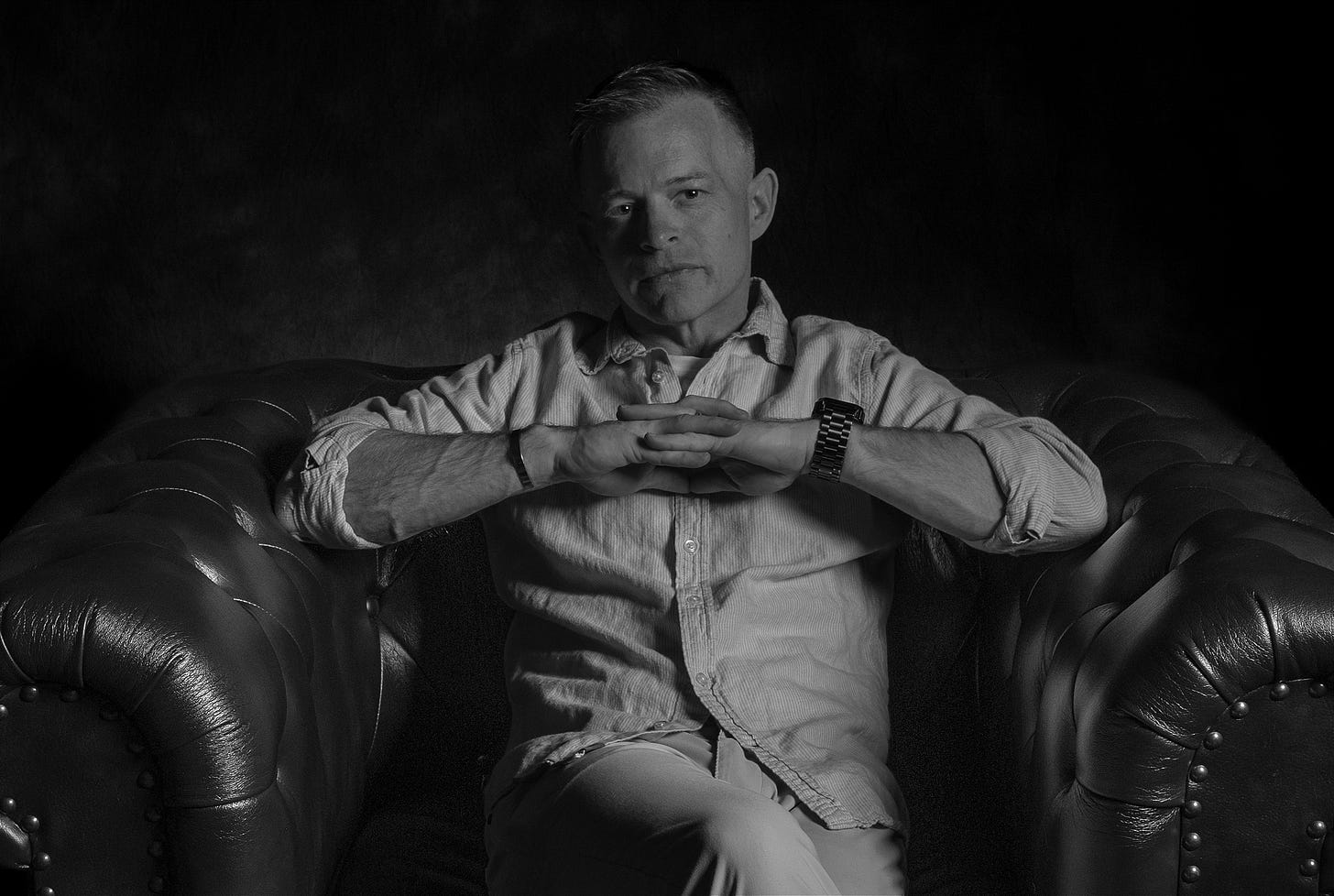The Spirit of Recovery: Episode One
From Combat to Connection: A Story of PTSD, Recovery, and Grace
A Lifetime of Strength, A Moment of Reckoning
In January 2009, I stepped off the ramp of a C-130 Hercules cargo plane onto the dusty tarmac of Al Asad Airfield in west-central Iraq. The air was thick with the scent of hot earth, aircraft fuel, and the stale tang of sweat soaked into uniforms worn for days. A fine, baby-powder dust coated everything, rising in slow, choking clouds with every step. The world was monochrome—tan stretched in every direction, from the cracked ground to the sun-bleached buildings, blending seamlessly with the horizon. Even the sparse greenery—twisted tamarisks and hardy date palms—wore a permanent veil of dust, their leaves dulled and brittle, like rugs that had never been shaken out.
I was a member of a small team of specialists in the Marine Corps trained for a unique job. Once we arrived in country, we quickly departed the safety of the US controlled airbase and set out across the Syrian Desert to create our own secret base and listening post. Our mission was to detect and intercept weapons smugglers coming across the Syrian border, supplying Al Qaeda with ammunition used to attack coalition forces. We also set up training ranges to teach various US and international military agencies and groups, including the Iraqi Army. With great swagger we walked onto the scene, determined to leave our mark—and we did. What happened over the next 11 months could fill a book of war stories, and maybe one day, I’ll find a way to tell them. Suffice it to say, my time in the Syrian desert was tumultuous and challenging in ways I wouldn’t fully comprehend until many years later.
For most of my life, I believed that resilience meant pushing forward at all costs. I spent years chasing achievements, always looking for the next challenge to prove to myself—and the world—that I was capable, competent, and in control. I had built a life on structure and discipline, distinguishing myself through special assignments, rising through the ranks, solving problems, and making hard decisions. But trauma is not something that respects discipline. It does not yield to intelligence or willpower. No matter how much I tried to outwork or outthink it, the weight of my past refused to stay buried.
The Moment That Changed Everything
I don’t know if there was one single moment that shattered the illusion I was fine—or if it was the quiet accumulation of a thousand cracks—but I do remember the first time I saw it reflected back at me.
It was late in the afternoon after a long day at work. My daughter, then six or seven years old, decided to play a trick and hide behind the door to scare me when I came in through the garage. I walked through the door like a man on a mission, already thinking about the work I needed to do that evening. She jumped out and yelled “boo!” I spun around—eyes wide, teeth clenched, body tense. I yelled at the top of my lungs with a ferocity she had never heard before. The look on her face—fear, confusion, sadness—stopped me cold. She collapsed into tears immediately. I dropped to one knee and hugged her tight, but I knew in that moment something was wrong. Not just with me—but with the way I was trying to carry everything alone.
There were other moments too. Like the time I sat in the driveway, engine off, unable to get out of the car. My hands trembled on the steering wheel. My chest was tight. I was supposed to go inside, to be present, to smile and say everything was okay. But I couldn’t move. I stared at the garage door, feeling like an intruder in my own life.
After years of pointing to my accomplishments as proof I was fine, I finally reached a point where the act collapsed. I was exhausted. Fraying at the edges. The nightmares. The constant hypervigilance. The mood swings. The way my mind replayed things I did not want to remember, like I was addicted to the horror of it all. The way my body never seemed to come down from alert. The way I pulled away from people I loved, unable to explain why I felt like a stranger in my own skin.
Still, I told myself it wasn’t bad enough. That I just needed to push through.
Until I couldn’t.
Why Share This Story?
In my experiences talking to others, I have come to understand that healing from trauma is often misunderstood. People seem to imagine it as a process of working through the past until, eventually, it loses its hold on you. They think of it as an unraveling, a shedding of pain until all that remains is the “real” you—the you that existed before the damage was done. But that is not how it works… at least not for me. Healing has not been about returning to some earlier version of myself. Instead, it has been about learning how to exist fully in the present, as the person I am now.
The biggest revelation I have had in this journey is that my greatest obstacle was not what had happened to me—it was my inability to accept myself in the aftermath. I wanted a version of healing where I could just process the past and move forward, stronger and unchanged. What I needed, instead, was to learn how to live with the reality of who I was, without shame or resistance.
Introducing: The Spirit of Recovery
The Spirit of Recovery offers an unfiltered look into one of the most pivotal chapters of my healing: the experience of being matched with and training alongside my service dog, Spirit. The stories I’ll share are raw, honest, and, at times, difficult to read—but they are also filled with moments of unexpected grace, humor, and hope. Because at the end of the day, that is what recovery is: a process of rediscovering our own humanity, one step at a time.
I am sharing this series because I know I am not alone in this struggle. Whether you are a veteran, a survivor, or simply someone who has faced deep and painful wounds, you may know what it feels like to wrestle with the idea that healing isn’t about fixing what is broken—it is about learning how to live with what remains. You may know what it feels like to carry guilt or shame over the ways you struggle, to believe that you should be “better” by now.
If so, this is for you. If you know of someone who can relate, consider sharing this series with them, too!
What to Expect
Each week, I will share a new chapter in this journey, beginning with the first phone call telling me the dog was ready, to my first days of training to become certified with Spirit, and moving through the highs and lows of learning to live and work with my service dog. Some weeks will be lighthearted, filled with anecdotes of Spirit’s quirks and triumphs. Others will be heavier, exploring the deep emotional work that comes with accepting the help we need.
I hope that, through these stories, you find something that resonates. I hope that, if you are struggling, this series reminds you that you are not alone. And I hope that, above all else, it helps you see that healing is not about erasing the past. It is about learning how to walk forward with it, step by step, with courage, grace, and maybe even a little help from a four-legged friend.
I invite you to join me on this journey. Let’s walk it together.
About the Author
E.S. Vorm, PhD is an active-duty U.S. Navy officer with over two decades of experience in aviation, special operations, and applied psychological research. His work has taken him from combat zones to high-level research labs, but his most challenging mission has been the one within—navigating the hidden wounds of war, traumatic brain injury, and post-traumatic stress.
Currently serving while also walking a personal path of recovery, Vorm writes with unflinching honesty about trauma, healing, and the search for meaning beyond achievement. His reflections draw from a lifetime of high-performance environments—and the cost of living in constant survival mode.
He lives with his family and service dog, Spirit in Southern Maryland, finding purpose in the quiet moments: parenting, homeschooling, and learning how to stay present for the life he once kept at arm’s length.







